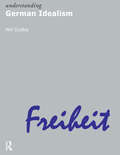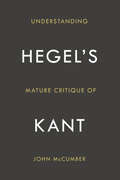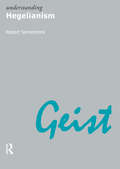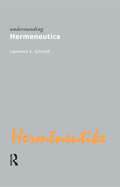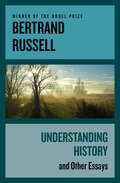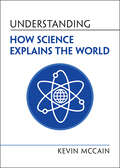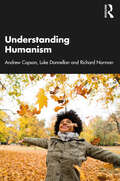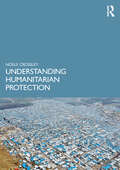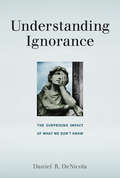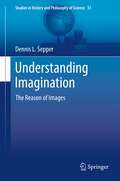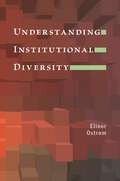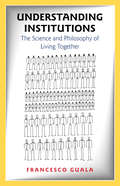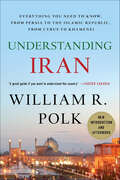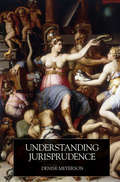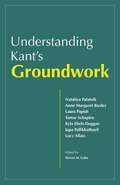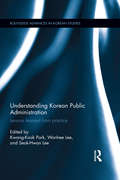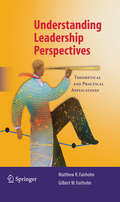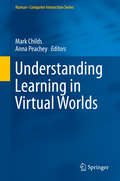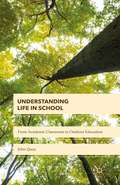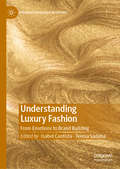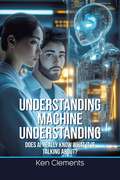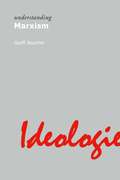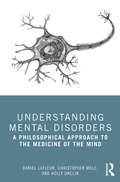- Table View
- List View
Understanding German Idealism (Understanding Movements In Modern Thought Ser.)
by Will Dudley"Understanding German Idealism" provides an accessible introduction to the philosophical movement that emerged in 1781, with the publication of Kant's monumental "Critique of Pure Reason", and ended fifty years later, with Hegel's death. The thinkers of this period, and the themes they developed revolutionized almost every area of philosophy and had an impact that continues to be felt across the humanities and social sciences today. Notoriously complex, the central texts of German Idealism have confounded the most capable and patient interpreters for more than 200 years. "Understanding German Idealism" aims to convey the significance of this philosophical movement while avoiding its obscurity. Readers are given a clear understanding of the problems that motivated Kant, Fichte, Schelling and Hegel and the solutions that they proposed. Dudley outlines the main ideas of transcendental idealism and explores how the later German Idealists attempted to carry out the Kantian project more rigorously than Kant himself, striving to develop a fully self-critical and rational philosophy, in order to determine the meaning and sustain the possibility of a free and rational modern life. The book examines some of the most important early criticisms of German Idealism and the philosophical alternatives to which they led, including romanticism, Marxism, existentialism, and naturalism.
Understanding Hegel's Mature Critique of Kant
by John MccumberHegels critique of Kant was a turning point in the history of philosophy: for the first time, the concrete, situated, and in certain senses "naturalistic" style pioneered by Hegel confronted the thin, universalistic, and argumentatively purified style of philosophy that had found its most rigorous expression in Kant. The controversy has hardly died away: it virtually haunts contemporary philosophy from epistemology to ethical theory. Yet if this book is right, the full import of Hegels critique of Kant has not been understood. Working from Hegels mature texts (after 1807) and reading them in light of an overall interpretation of Hegels project as a linguistic, "definitional" system, the book offers major reinterpretations of Hegels views: The Kantian thing-in-itself is not denied but relocated as a temporal aspect of our experience. Hegels linguistic idealism is understood in terms of his realistic view of sensation. Instead of claiming that Kants categorical imperative is too empty to provide concrete moral guidance, Hegel praises its emptiness as the foundation for a diverse society.
Understanding Hegelianism (Understanding Movements In Modern Thought Ser.)
by Robert Sinnerbrink"Understanding Hegelianism" explores the ways in which Hegelian and anti-Hegelian currents of thought have shaped some of the most significant movements in twentieth-century European philosophy, particularly the traditions of critical theory, existentialism, Marxism and poststructuralism. The first part of the book examines Kierkegaard's existentialism and Marx's materialism, which present two defining poles of subsequent Hegelian and anti-Hegelian movements. The second part looks at the contrasting critiques of Hegel by Lukacs and Heidegger, which set the stage for the appropriation of Hegelian themes in German critical theory and the anti-Hegelian turn in French poststructuralism. The role of Hegelian themes in the work of Adorno, Habermas and Honneth are explored. In the third part, the rich tradition of Hegelianism in modern French philosophy is considered - the work of Wahl, Kojeve, Hyppolite, Lefebvre, Sartre, de Beauvoir as well as the radical critique of Hegelianism articulated by Derrida and Deleuze. Although the focus is primarily on German and French appropriations of Hegelian thought, the author also explores some of the recent developments in Anglophone Hegelianism.
Understanding Hermeneutics
by Lawrence Kennedy SchmidtThis series provides short, accessible and lively introduction to the major schools, movements and traditions in philosophy and the history of ideas since the beginning of the Enlightenment. All books in the series are written for undergraduates meeting the subject for the first time. Hermeneutics concerns itself with the theory of understanding and the interpretation of language. The question of how to correctly interpret and understand others remains one of the most contested branches of philosophy. In Understanding Hermeneutics Lawrence Schmidt provides an introduction to modern hermeneutics through a systematic examination of the ideas of its key philosophical proponents. Chapter 1 examines the ideas, of the Protestant theologian, Friedrich Schleiermacher, who argues that misunderstanding is always possible so we must always employ interpretation if we are to understnad correctly. Chapter 2 discusses the ideas of Dilthey, who maintains that understanding in the humanities is fundamentally different from explanation in the natural sciences, and who presents a methodology to judge what another person means or feels by means of their language and also their gestures, facial expressions, and manners of acting. Chapter 3 explores the ideas of Heidegger who radicalizes the concept by shifting its focus from interpreting texts to an existential interpretation of human being. In Chapter 4 the recent ideas of Gadamer are examined, which extend to examining the structures of hermeneutic experience and to question the supremacy of the natural sciences as models for truth. The final chapters consider some of the criticisms and controversies surrounding hermeneutics, including the work of Habermas, Hirsch, Ricoeur and Derrida, and the prospects for the future of hermeneutics.
Understanding History: And Other Essays
by Bertrand RussellEssays on topics from nuclear physics to the role of faith in society from the Nobel Prize–winning philosopher. Originally written in 1943 and published in 1957 by Philosophical Library, Inc, these vigorous essays from one of the most distinguished minds of our time reveal several facets of the English philosopher&’s thought. The title piece exposes the deadliness of the academic approach to the past, and shows how the reading of history can be a vivid intellectual pleasure. In &“The Value of Free Thought,&” Russell once again proves himself a ruthless foe of stifling orthodoxy and a fearless champion of free thought, free action and free speech. Then in a series of articles on a subject near to his heart, he explores the effect of atomic physics on such philosophic concepts as materialism, idealism, determinism and faith. In short, here is a complete banquet of provocative ideas—wise and witty; skeptical and profound—to whet the appetite of every discriminating reader.
Understanding History: And Other Essays
by Bertrand RussellEssays on topics from nuclear physics to the role of faith in society from the Nobel Prize–winning philosopher. Originally written in 1943 and published in 1957 by Philosophical Library, Inc, these vigorous essays from one of the most distinguished minds of our time reveal several facets of the English philosopher&’s thought. The title piece exposes the deadliness of the academic approach to the past, and shows how the reading of history can be a vivid intellectual pleasure. In &“The Value of Free Thought,&” Russell once again proves himself a ruthless foe of stifling orthodoxy and a fearless champion of free thought, free action and free speech. Then in a series of articles on a subject near to his heart, he explores the effect of atomic physics on such philosophic concepts as materialism, idealism, determinism and faith. In short, here is a complete banquet of provocative ideas—wise and witty; skeptical and profound—to whet the appetite of every discriminating reader.
Understanding How Science Explains the World (Understanding Life)
by Kevin McCainAll people desire to know. We want to not only know what has happened, but also why it happened, how it happened, whether it will happen again, whether it can be made to happen or not happen, and so on. In short, what we want are explanations. Asking and answering explanatory questions lies at the very heart of scientific practice. The primary aim of this book is to help readers understand how science explains the world. This book explores the nature and contours of scientific explanation, how such explanations are evaluated, as well as how they lead to knowledge and understanding. As well as providing an introduction to scientific explanation, it also tackles misconceptions and misunderstandings, while remaining accessible to a general audience with little or no prior philosophical training.
Understanding Humanism
by Richard Norman Andrew Copson Luke DonnellanUnderstanding Humanism is an easy-to-read and informative overview of the beliefs, practices, and values of humanism as a non-religious worldview. This short and lively book explores humanism both as a broad historical tradition of thought and as a stance embodied in organised institutions. It sets out clearly and systematically the beliefs and values of humanism as well as the reality and personal experience of living as a humanist today. Questions discussed in this book include: How do humanists see the relation between science and religious belief? Is humanism wedded to science as the only valid form of knowledge? What value do humanists place on the arts, and can they value religious art? Does the emphasis on human responsibility depend on an untenable belief in 'free will', and is this undermined by psychology and neuroscience? Do humanists think that life is sacred? What account would humanists give of the basis of human rights, and why they are important? Does humanism entail that human life is meaningless and pointless? Can humanists meet the challenge of nihilism? Understanding Humanism provides a reliable and easily digestible introduction to the field. By exploring these questions and inviting readers to engage with the arguments, it serves as the ideal textbook for those approaching the topic of humanism for the first time.
Understanding Humanitarian Protection
by Noele CrossleyThis new textbook provides an introduction to humanitarian protection, a field of study concerned with international responses to armed conflict, political violence, and humanitarian crisis. The book engages with a wide range of empirical and normative questions, providing an overview of the academic literature whilst simultaneously discussing the policies and practices associated with protective responses to conflict and humanitarian emergencies that put the lives and livelihoods of vulnerable populations, including civilians, refugees, and minority groups, at risk. Divided into three parts, covering the origins of the humanitarian protection regime, the range of actors involved, and the responsibilities of these actors, the book offers an accessible entry point into the major contemporary debates, providing readers with the conceptual tools for understanding core issues. Key points are reinforced and illustrated through the deployment of selected case studies, and a comprehensive glossary is provided for key terms. Each chapter ends with a summary of key points, questions for further reflection, and a list of recommended reading. This book will be of much interest to students of human protection, humanitarianism, the Responsibility to Protect, human security, peacekeeping, and International Relations in general.
Understanding Ignorance: The Surprising Impact of What We Don't Know (The\mit Press Ser.)
by Daniel R. DenicolaAn exploration of what we can know about what we don't know: why ignorance is more than simply a lack of knowledge.Ignorance is trending. Politicians boast, “I'm not a scientist.” Angry citizens object to a proposed state motto because it is in Latin, and “This is America, not Mexico or Latin America.” Lack of experience, not expertise, becomes a credential. Fake news and repeated falsehoods are accepted and shape firm belief. Ignorance about American government and history is so alarming that the ideal of an informed citizenry now seems quaint. Conspiracy theories and false knowledge thrive. This may be the Information Age, but we do not seem to be well informed. In this book, philosopher Daniel DeNicola explores ignorance—its abundance, its endurance, and its consequences.DeNicola aims to understand ignorance, which seems at first paradoxical. How can the unknown become known—and still be unknown? But he argues that ignorance is more than a lack or a void, and that it has dynamic and complex interactions with knowledge. Taking a broadly philosophical approach, DeNicola examines many forms of ignorance, using the metaphors of ignorance as place, boundary, limit, and horizon. He treats willful ignorance and describes the culture in which ignorance becomes an ideological stance. He discusses the ethics of ignorance, including the right not to know, considers the supposed virtues of ignorance, and concludes that there are situations in which ignorance is morally good.Ignorance is neither pure nor simple. It is both an accusation and a defense (“You are ignorant!” “Yes, but I didn't know!”). Its practical effects range from the inconsequential to the momentous. It is a scourge, but, DeNicola argues daringly, it may also be a refuge, a value, even an accompaniment to virtue.
Understanding Imagination: The Reason of Images
by Dennis L SepperThis book discusses that imagination is as important to thinking and reasoning as it is to making and acting. By reexamining our philosophical and psychological heritage, it traces a framework, a conceptual topology, that underlies the most disparate theories: a framework that presents imagination as founded in the placement of appearances. It shows how this framework was progressively developed by thinkers like Plato, Aristotle, Descartes, and Kant, and how it is reflected in more recent developments in theorists as different as Peirce, Saussure, Wittgenstein, Benjamin, and Bachelard. The conceptual topology of imagination incorporates logic, mathematics, and science as well as production, play, and art. Recognizing this topology can move us past the confusions to a unifying view of imagination for the future.
Understanding Institutional Diversity
by Elinor OstromThe analysis of how institutions are formed, how they operate and change, and how they influence behavior in society has become a major subject of inquiry in politics, sociology, and economics. A leader in applying game theory to the understanding of institutional analysis, Elinor Ostrom provides in this book a coherent method for undertaking the analysis of diverse economic, political, and social institutions.Understanding Institutional Diversity explains the Institutional Analysis and Development (IAD) framework, which enables a scholar to choose the most relevant level of interaction for a particular question. This framework examines the arena within which interactions occur, the rules employed by participants to order relationships, the attributes of a biophysical world that structures and is structured by interactions, and the attributes of a community in which a particular arena is placed.The book explains and illustrates how to use the IAD in the context of both field and experimental studies. Concentrating primarily on the rules aspect of the IAD framework, it provides empirical evidence about the diversity of rules, the calculation process used by participants in changing rules, and the design principles that characterize robust, self-organized resource governance institutions.
Understanding Institutions: The Science and Philosophy of Living Together
by Francesco GualaUnderstanding Institutions proposes a new unified theory of social institutions that combines the best insights of philosophers and social scientists who have written on this topic. Francesco Guala presents a theory that combines the features of three influential views of institutions: as equilibria of strategic games, as regulative rules, and as constitutive rules.Guala explains key institutions like money, private property, and marriage, and develops a much-needed unification of equilibrium- and rules-based approaches. Although he uses game theory concepts, the theory is presented in a simple, clear style that is accessible to a wide audience of scholars working in different fields. Outlining and discussing various implications of the unified theory, Guala addresses venerable issues such as reflexivity, realism, Verstehen, and fallibilism in the social sciences. He also critically analyses the theory of "looping effects" and "interactive kinds" defended by Ian Hacking, and asks whether it is possible to draw a demarcation between social and natural science using the criteria of causal and ontological dependence. Focusing on current debates about the definition of marriage, Guala shows how these abstract philosophical issues have important practical and political consequences. Moving beyond specific cases to general models and principles, Understanding Institutions offers new perspectives on what institutions are, how they work, and what they can do for us.
Understanding Iran: Everything You Need to Know, from Persia to the Islamic Republic, from Cyrus to Khamenei
by William R. PolkWilliam R. Polk provides an informative, readable history of a country which is moving quickly toward becoming the dominant power and culture of the Middle East. A former member of the State Department's Policy Planning Council, Polk describes a country and a history misunderstood by many in the West. While Iranians chafe under the yolk of their current leaders, they also have bitter memories of generations of British, Russian and American espionage, invasion, and dominance. There are important lessons to be learned from the past, and Polk teases them out of a long and rich history and shows that it is not just now, but for decades to come that an understanding of Iran will be essential to American safety and well-being.
Understanding Jurisprudence
by Denise MeyersonConsidering general philosophical and theoretical questions about the nature, purpose and operation of law as a whole, this book introduces students to contemporary debates in jurisprudence and encourages them to think in a theoretical and critical way about the nature of law, legal reasoning and adjudication. Discussing wider issues of morality, politics and society with reference to legal cases and examples, it provides as broad a perspective on the law as possible. Key features of this textbook include: introductions to each chapter analysis of how jurisprudential issues can arise in everyday life a wide range of cases to ground the theoretical discussion in-depth discussion of the relationship of law to force, morality and politics, as well as of rights, justice and feminist jurisprudence. The text provides a concise treatment of all the major topics typically covered in an undergraduate course on jurisprudence and succinctly explains the arguments for and against the different approaches to the issues that are raised.
Understanding Kant's Groundwork
by Anne Margaret Baxley Tamar Schapiro Kyla Ebels-Duggan Laura Papish Laura Papi BaxleyImmanuel Kant's Groundwork for the Metaphysics of Morals is widely regarded as one of the most influential works in the history of moral philosophy. Indeed, any student of ethics will soon encounter a translation of the book, although trying to read it is likely to cause bewilderment. What, one may ask, is Kant trying to say? This book provides the answers. Here, seven highly regarded teachers and scholars of Kant's ethics offer remarkably clear explanations of the most important concepts in the Groundwork: the good will, happiness, duty, hypothetical and categorical imperatives, the Formula of Universal Law, the Formula of Humanity, and freedom.
Understanding Kant’s Ethics
by Michael CholbiKant's ethical thought remains one of the most influential, yet notoriously challenging, systems in the history of philosophy. This volume provides a sympathetic but critical reconstruction of the main strands of Kant's ethics, focusing on the most commonly read of Kant's ethical works, the Groundwork of the Metaphysics of Morals. Part I outlines Kant's arguments in defense of his Categorical Imperative, as well as elaborating Kant's understanding of dignity and human freedom. Part II addresses the most common objections to Kant's ethics, including challenges to the Formula of Universal Law; Kant's controversial ethical stances on suicide, sex and marriage, and non-human animals; and the place of reason, sentiment, and happiness in Kant's ethics. For scholars and specialists alike, the volume offers a clear and accessible account of what Kantian morality both offers us and asks of us.
Understanding Korean Public Administration: Lessons learned from practice (Routledge Advances in Korean Studies)
by Wonhee Lee Kwang-Kook Park Seok-Hwan LeeAlthough much has been written about the Korean public administration, the international academic community has little knowledge about it as most of the literature has been written in Korean. This book aims to provide more accessible knowledge internationally by filling that gap, covering both the history and the current status of the Korean public administration. This book is a collaboration of many Korean public administration scholars and would appeal to those interested in the secrets of Korea’s rapid development in such a short span of time. Each chapter covers historical contexts, key to understanding its public administration and an important aspect as Korea is a fast changing society. The book takes on a more pragmatic approach rather than to put the Korean experiences into the western theory. Each chapter therefore provides an extensive discussion on the lessons-learned and practical implications.
Understanding Leadership Perspectives
by Matthew R. Fairholm Gilbert W. FairholmThere is no dearth of popular books on leadership, often extolling the virtues of charismatic, celebrity leaders or offering simplistic formulas for "inspiring the troops" to achieve "extraordinary results". However, empirical research and exploration of leadership and its many elements is in much less supply. Confronted by failures of leadership in all of our major institutions--business, government, educational, cultural, medical, and spiritual--researchers, concerned citizens, and would-be leaders alike are interested in the prospects for achieving effective leadership. This book fills a gap in the literature of Leadership Studies by presenting the Leadership Perspectives Model (LPM), which observes and analyzes leadership through five distinct orientations: scientific management, excellence management, values leadership, trust cultural leadership, and spiritual leadership. Operating from the premise that "leadership" and "management" require fundamentally different sets of tools, behaviors, and approaches, the authors unpack the distinctions and provide empirical, theoretical, and practical insights to improve our understanding of leadership dynamics in a world increasingly defined by complexity, diversity, technology-based communication, and interconnectivity. Presenting a comprehensive review of the field, including a history of the most influential schools of thought, and empirical studies of leadership in the public and private sectors, the authors dispel common myths and misconceptions about leadership and provide greater clarity to its art and science.
Understanding Learning in Virtual Worlds
by Anna Peachey Mark ChildsSince the publication of the companion volume Researching Learning in Virtual Worlds in 2010, there has been a growth not only in the range and number of educational initiatives taking place in virtual worlds, but also in the depth of analysis of the nature of that education. Understanding Learning in Virtual Worlds reflects those changes through a collection of chapters that are extended versions of research presented at the second Researching Learning in Virtual Environments conference (ReLIVE 11), an international conference hosted by the Open University UK. Included in this book are chapters that explore the philosophical and methodological underpinnings of understanding learning in virtual worlds, identify and analyse the factors that support learning in these environments, and present case studies that demonstrate some of the various ways in which virtual worlds can be applied to facilitate learning and teaching. The links between learning in a virtual world and learning in the physical world are made apparent throughout, and the authors reveal how understanding learning in one informs the other. Understanding Learning in Virtual Worlds is an important book not only to those who teach in virtual worlds, but to anyone for whom understanding learning, in all its forms, is of interest.
Understanding Life in School: From Academic Classroom to Outdoor Education
by John QuayAttending school is an experience that most people share but this leads us to accept rather than question the experience. Using the philosophies of Heidegger and Dewey, John Quay explores life in schools and juxtaposes the environment of a school camp with that of an academic classroom.
Understanding Luxury Fashion: From Emotions to Brand Building (Palgrave Advances in Luxury)
by Teresa Sádaba Isabel CantistaOffering an original contribution to the field of luxury and fashion studies, this edited collection takes a philosophical perspective, addressing the idea that humans need luxury. From this framework it delves deep into two particular dimensions of luxury, emotions and society, and concludes with cases of brand building in order to illustrate the two dimensions at work. Comparative analysis between countries is brought together with an emphasis on China. Chapters address the ongoing growth in the market, as well as the significant changes in the sector brought about by fast international expansion and an increased focus on ethical supply and sustainability, making the book an insightful read for scholars of fashion business, luxury and branding.
Understanding Machine Understanding: Does AI Really Know What It Is Talking About?
by Ken ClementsThis is a comprehensive and thought-provoking exploration of the nature of machine understanding, its evaluation, and its implications. The book proposes a new framework, the Multifaceted Understanding Test Tool (MUTT), for assessing machine understanding
Understanding Marxism: Understanding Marxism (Understanding Movements In Modern Thought Ser.)
by Geoff BoucherMarxism as an intellectual movement has been one of the most important and fertile contributions to twentieth-century thought. No social theory or political philosophy today can be taken seriously unless it enters a dialogue, not just with the legacy of Marx, but also with the innovations and questions that spring from the movement that his work sparked, Marxism. Marx provided a revolutionary set of ideas about freedom, politics and society. As social and political conditions changed and new intellectual challenges to Marx's social philosophy arose, the Marxist theorists sought to update his social theory, rectify the sociological positions of historical materialism and respond to philosophical challenges with a Marxist reply. This book provides an accessible introduction to Marxism by explaining each of the key concepts of Marxist politics and social theory. The book is organized into three parts, which explore the successive waves of change within Marxist theory and places these in historical context, while the whole provides a clear and comprehensive account of Marxism as an intellectual system.
Understanding Mental Disorders: A Philosophical Approach to the Medicine of the Mind
by Daniel Lafleur Christopher Mole Holly OnclinUnderstanding Mental Disorders aims to help current and future psychiatrists, and those who work with them, to think critically about the ethical, conceptual, and methodological questions that are raised by the theory and practice of psychiatry. It considers questions that concern the mind’s relationship to the brain, the origins of our norms for thinking and behavior, and the place of psychiatry in medicine, and in society more generally. With a focus on the current debates around psychiatry’s diagnostic categories, the authors ask where these categories come from, if psychiatry should be looking to find new categories that are based more immediately on observations of the brain, and whether psychiatrists need to employ any diagnostic categories at all. The book is a unique guide for readers who want to think carefully about the mind, mental disorders, and the practice of psychiatric medicine.
